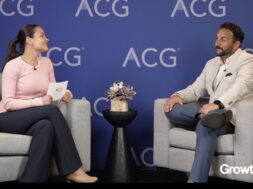Middle-Market Public Policy Roundup
A House committee held a private equity hearing, the U.S. Chamber of Commerce evaluated the Stop Wall Street Looting Act, and a federal government shutdown was averted until December.

With contributions by Maria Wolvin and Ben Marsico.
Updated on Nov. 21
In this week’s roundup, we examine the House Committee on Financial Services’ private equity hearing. On Tuesday, supporters and opponents gathered in Washington, D.C., to discuss industry practices, and lawmakers considered proposed legislation that would impact private equity.
A week before the hearing, the U.S. Chamber of Commerce published a study on a bill known as the Stop Wall Street Looting Act. The report estimated the sweeping legislation would eliminate up to 29 million jobs and cost billions of dollars per year in lost tax revenue.
Meanwhile, Congress averted a federal government shutdown that would have taken effect late Thursday. Leaders in the House and Senate agreed to a stopgap budget that will last until December, setting up a possible confrontation next month. The temporary funding measure secured funding for several government initiatives, but the fate of the Export-Import Bank remains unsettled after its charter was blocked by the Senate and White House.
Financial Services Committee Holds Private Capital Hearing
The House Financial Services Committee held a hearing on Tuesday titled “America for Sale: An Examination of Private Funds.” The full committee hearing, which lasted for over three hours, explored issues related to private equity investment in the retail, health and housing sectors, as well as LP concerns about fees and disclosures.
The hearing focused largely on H.R. 3848, better known as the Stop Wall Street Looting Act, the House companion to the Senate bill being spearheaded by Sen. Elizabeth Warren, D-Mass.
Republican members were united in their opposition of the legislation and defended the private equity industry’s impact on the economy. Tying the hearing directly to the 2020 presidential campaign, Republicans came out strong against the anti-PE rhetoric that underlies the Warren bill, pointing out the overwhelming success of most private equity investments, the critical source of capital that private equity provides—especially for small and midsize companies—and how private equity delivers consistent high returns for pensions across the U.S.
Meanwhile, Democrats argued that private equity is an industry that needs to be “reined in,” citing retail bankruptcies like Toys “R” Us, which displaced several thousand workers; surprise medical billing from private equity-owned physician staffing firms; and slower response times in PE-backed health and public safety firms.
However, not all Democrats on the committee voiced support for the far-reaching legislation. Instead, a number of Democrats emphasized that private equity provides a critical source of capital and, while there may be some bad actors, the industry as a whole should not be vilified.
As for middle-market private equity, some members of Congress and several witnesses pointed out that many of the concerns about private equity do not apply to small and middle-market PE deals. For example, Eileen Appelbaum, co-director at the Center for Economic and Policy Research, who was generally critical of private equity, stated in her written testimony:
… smaller PE funds typically acquire small and medium-sized enterprises that can benefit from the access to financing and improvements in operations and business strategy that private equity firms can provide. These PE funds use relatively low levels of debt, provide financing to upgrade operations, advise on implementation of modern IT, accounting, and management systems, and appoint board members that can assist with business strategy. These improvements in governance, operations, and strategy create value for the companies and the economy.
Others emphasized the critical need that private equity fills in providing capital for growing middle-market businesses. Rep. Steve Stivers, R-Ohio, who received a Growth Award from ACG during the association’s fly-in this summer, made this point strongly.
“I am the co-chair of the Middle Market Caucus. These middle-market companies dot this country and are in every congressional district in America, and private equity helps them,” he said.
Warren’s PE Plan Could Cut Up to 29.3 Million Jobs: U.S. Chamber of Commerce Report
Millions of jobs and billions in tax revenue could be at stake if proposed legislation targeting private equity is passed, according to a recent report from the U.S. Chamber of Commerce, a pro-business advocacy group.
The study found that the regulatory and tax provisions of Massachusetts Sen. Elizabeth Warren’s “Stop Wall Street Looting Act” could result in a loss of 6.9 million jobs under “modest” estimates. Less conservative figures point to job losses of 29.3 million—over 15% of the nation’s workforce.
“In the worst-case scenario, the [private equity] industry would cease to exist,” wrote Charles Swenson, a business professor at the University of Southern California and one of the study’s authors.
The losses could also negatively impact the nation’s finances. According to the study, the legislation could reduce federal, state and local tax revenue by between $109 billion and $475 billion annually.
The study was published on Nov. 12, one week before the House Financial Services Committee’s scheduled hearings about private equity’s impact on the U.S. economy.
Government Shutdown Averted with Temporary Funding, Ex-Im Bank Holds On
Congressional leaders struck a deal to prevent a government shutdown before a Thursday night deadline, leading to a potential showdown in December centered on border wall funding.
The stopgap budget was proposed by House Democrats on Monday and will fund the government until Dec. 20. The legislation faces a vote on Tuesday and is expected to pass.
Senate Majority Leader Mitch McConnell, R-Ky., said the funding bill would be taken up and voted on Thursday before the funding deadline at midnight.
Lawmakers say they will continue to work on a permanent solution for the nation’s budget but disagreement over border wall funding and the impeachment inquiry have prevented talks from progressing.
Ex-Im Bank Funded Until Deadline
The temporary spending bill contains provisions to keep the U.S. Census funded through 2020, reverses some canceled federal highway spending and hikes pay for members of the military. The funding measure also provides an additional month of funding for the Export-Import Bank, which faces an uncertain future after Dec. 20.
While included in the budget stopgap, the bank’s charter is unlikely to be reauthorized before the December deadline—even if Congress avoids a government shutdown.
The House passed a funding bill to extend the bank for five years on Nov. 15, but the Senate and White House have announced their intention to block it.
The Export-Import Bank, which underwrites loans and provides other forms of financial assistance to businesses exporting goods and services overseas, relies on congressional authorization to remain open.
Funding the 85-year-old bank has historically been uncontroversial, but the institution has become a lightning rod for Republicans and Democrats in recent years. Its first funding lapse occurred in 2015 for five months.
Factions in both parties criticize the Export-Import Bank for providing what they say is unnecessary aid to large companies. (Boeing, GE and Caterpillar received 97% of the bank’s financing in 2013.) But proponents say the bank secures export financing for small and medium-sized businesses that traditional lenders would not support.
On Nov. 14, the Export-Import Bank released a plan in the event the federal government does not renew its charter. According to a summary, the bank has enough funding to last until Jan. 20.
In past furloughs, the bank has continued to do business with current clients but did not take on new ones.
Are you an ACG member who enjoys reading the public policy roundup? Join our Public Policy Interest Group to receive even more in-depth coverage of federal policy activity impacting the middle market, as well as opportunities to help shape ACG’s advocacy efforts.

Benjamin Glick is ACG Global’s marketing and communications associate.


